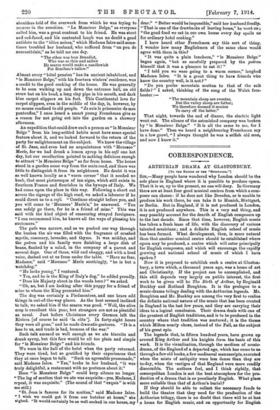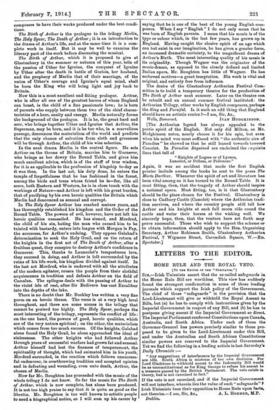CORRESPONDENCE.
ARTHURIAN DRAMA AT GLASTONBURY.
rTo rns Ennos or Tam •'8rzuszos."1
Sin,—Many people have wondered why London should be the sole place in England where it is possible to produce opera. That it is so, up to the present, no one will deny. In Germany there are at least four good musical centres from which a com- poser can choose: if he does not like Dresden, or is unable to produce his work there, ho can take it to Munich, Stuttgart, or Berlin. But in England, if it is not produced in London, it is not produced anywhere. This is is very sad thing, and may possibly account for the dearth of English composers up to the last decade. Since that time, however, English music has taken a fresh lease of life, with the discovery of various talented musicians ; and a definite English school of music has been formed. What development, then, is more natural than that another musical centre should be established where opera may be produced, a centre which will cater principally for English composers, and which will encourage the rapidly growing and national school of music of which I have spoken ?
Now it is proposed to establish such a centre at Glaston- bury, a town which, a thousand years ago, was a home of art and Christianity. If the project can be accomplished, and this still depends very largely on public interest, the first work to be given will be The Birth of Arthur, by Reginald Buckley and Rutland Boughton. It is the prologue to a music-drama trilogy dealing with the Arthurian legends. Mr. Boughton and Mr. Buckley are among the very first to realize the definite national nature of the music that bas been created in England in the last few years, and they are carrying their ideas to a logical conclusion. Their drama deals with one of the greatest of English traditions, and is to be produced in the country where that tradition was nurtured; it is the theme which Milton nearly chose, instead of the Fall, as the subject of his great epic.
The legends that, in fifteen hundred years, have grown up around King Arthur and his knights form the basis of this work. It is the visualization, through the medium of music- drama, of the England of a departed age, which has come to us through a few old books, a few mediaeval manuscripts, executed when the mists of antiquity were less dense than they are to-day, when the vestiges of that England were more readily discernible. The authors feel, and I think rightly, that cosmopolitan London is not the best atmosphere for the pro- duction of a drama that is so peculiarly English. What plane more suitable than that of Arthur's burial ?
If they should be able to collect the necessary funds to build the theatre that they need for the production of the Arthurian trilogy, there is no doubt that there will be at last a home for English music, and an opportunity for English composers to have their works produced under the best condi- tions.
The Birth of Arthur is the prologue to the trilogy Merlin, The Holy Spear, The Death of Arthur; it is an introduction to the drama of Arthur's life, and at the same time it is a com- plete work in itself. But it may be well to examine the literary part of the work before discussing the musical. The Birth of Arthur, which it is proposed to give at Glastonbury in the summer or autumn of this year, tells of the passion of Uther for Igraine, the conquest of Igraine by Uther after the death in battle of 13 oriole, her husband, and the prophecy of Merlin that of their marriage, of the . union of Uther's courage and Igraine's equal mind, shell be born the King who will bring light and joy back to Britain.
Now this is a most excellent and fitting prologue. Arthur, who is after all one of the greatest heroes of whom England can boast, is the child of a fine passionate love; he is born of parents who supply between them two of the chief charac- teristics of a hero, sanity and energy. Merlin naturally forms the background of the prologue. It is he, the great bard and seer, who brings together Uther and Igraine that Arthur, the Superman, may be born, and it is he too who, in a marvellous passage, denounces the materialism of the world and predicts that the only chance of salvation from sloth and grossness will be through Arthur, the child of his wise selection.
In the next drama Merlin is the central figure. He sets Arthur on the throne of Britain, marries him to Guenever, who brings ae her dowry the Round Table, and gives him much excellent advice, which is of the stuff of true wisdom, for it is as applicable to the profession of kingship to-day as it was then. In the last act, his duty done, be enters the temple of forgetfulness that he has fashioned in the forest, among the birds and trees whose friend he is—for, like all seers, both Eastern and Western, he is in close touch with the workings of Nature—and Arthur is left with his great burden, that of purifying by his own heroic qualities the Britain which Merlin had denounced as sensual and corrupt.
In The Holy Spear Arthur has reached mature years, and has thoroughly established his kingdom and the Order of the Round Table. The powers of evil, however, have not left his heroic qualities unessailed. He has sinned, and Mordred, the child of his sin, hating the man who caused him to be tainted with bastardy, enters into league with Morgan le Fay, the sorceress, for Arthur's undoing. They oppose Galahad's determination to seek the Holy Grail, and on the return of the knights in the first act of The Death of Arthur, after a fruitless quest, they conspire to destroy Arthur's confidence in Guenever. This, thanks to Launcelot's tempestuous love, they succeed in doing, and Arthur is left surrounded by the ruins of his life-work, his kingdom divided against itself. In the last act Mordred, who is endowed with all the attributes of the modern agitator, rouses the people from their slothful acquiescence in tradition and defeats Arthur on the field of Camalan. The epilogue deals with the passing of Arthur to the violet isle of rest, after Sir Bedivere has cast Excalibur into the depths of the lake.
There is no doubt that Mr. Buckley has written a very fine poem on an heroic theme. The verse is at a very high level throughout, and there are some scenes in the trilogy that cannot be praised too highly. The Holy Spear, perhaps the most interesting of the trilogy, represents the conflict of life on the one hand, the powers of good, heroic qualities, which are of the very nature spiritual ; on the other, the materialism which comes from too much success. Of the knights, Galahad alone found the Holy Grail, he alone approached the ideal of einlessness. The other knights who had followed Arthur through years of successful warfare bad grown fat and sensual. Arthur himself had lost the fineness of temperament, the spirituality of thought, which had animated him in his youth, Mordred succeeded, in the reaction which follows unsuccess- ful endeavour, in overthrowing tradition and accepted opinion and in defeating and wounding, even unto death, Arthur, the chosen of Merlin.
How far Mr. Boughton has proceeded with the music of the whole trilogy I do not know. So far the mueio for The Birth of Arthur, which is now complete, has alone been produced. It is not too high praise to say that it is quite as good as the libretto. Mr. Boughton ie too well known to artistic people to need a biographical notice, so I will sum up his career by saying that he is one of the best of the young English com- posers. When I say "English" I do not only mean that he was horn of English parents. I mean that his music is of the type or colour which, in the last few years, has grown up in England. Having caught the elusive spirit of an age which can but exist in our imagination, he has given a greater form, an increased dramatic certainty, to the magnificent drama of Arthur's Birth. The most interesting quality of his music is its originality. Though Wagner was the originator of the music-drama, as opposed to the closely defined and limited Italian opera, Mr. Boughton has little of Wagner. He has eschewed motives—a great temptation. His work is vital and original, and entirely free from influence.
The desire of the Glastonbury Arthurian Festival Cone. mittee is to build a temporary theatre for the production of The Birth of Arthur next summer. Later on the theatre can be rebuilt and an annual summer festival instituted: the Arthurian Trilogy, other works by English composers, perhaps the Ring and Pareifal. Is it such an odd thing that England should have an artistic centre ?—I am, Sir, &c., [The Arthurian legend has always appealed to the poetic spirit of the English. Not only did Milton, as Mr. Hodgkinson notes, nearly choose it for his epic, but area when his mind was most suffused with "the authentic airs of Paradise" he showed us that he still leaned towards towered Camelot. In Paradise Regained are enshrined the exquisite lines that tell of
"Knights of Logres or of Lyones, Lancelot, or Pelleas, or Pellenore," Again, it was no accident that made the first English printer include among the books he sent to the press The Mode Darthur. Whenever the spirit of art and literature has been vital among us it has turned to the Round Table. It is most fitting, then, that the tragedy of Arthur should inspire a national opera. Most fitting, too, is it that Glastonbury should be the place chosen for the Festival. Glastonbury is close to Cadbury Castle (Camelot) where the Arthurian tradi- tion survives, and where the country people still tell how Arthur and his knights at each full moon ride round the castle and water their horses at the wishing well. We sincerely hope, then, that the venture here set forth may prove successful. Those who wish to support the scheme or to obtain information should apply to the Hon. Organizing Secretary, Arthur Robinson Smith, Glastonbury Arthurian Festival, 7 Wigmore Street, Cavendish Square, W.—En. Spectator.)











































 Previous page
Previous page